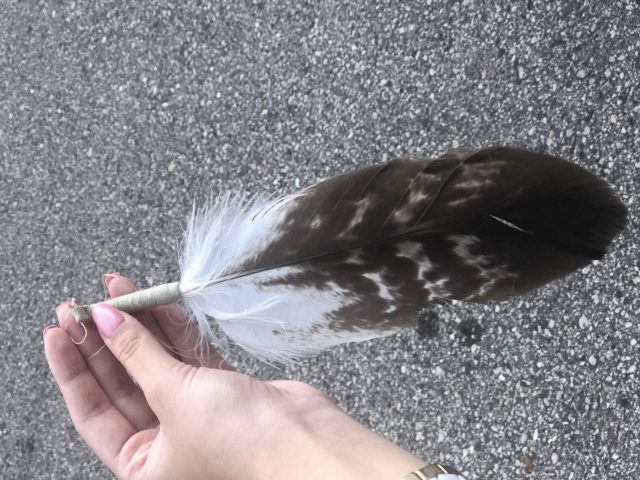Ariana Baccam stood with her giddy classmates on Sunday afternoon, all of them excited to process proudly into the auditorium at the Epic campus for their graduation from Verona Area High School. But she wasn’t giddy or excited. She was heartbroken, quietly weeping.
She had just been told that she would not be allowed to wear the eagle feather that symbolizes adulthood in her Lac Courte Oreilles Ojibwe culture, hanging from her mortarboard alongside her black and orange tassel.
“To me (the eagle feather) means that I’m finally an adult,” she said. “I’m a Native woman finally getting my eagle feathers. Means a lot to me because it means I’m an adult and I was able to not only prove to my family but my tribe that I was able to graduate high school and become a woman. I’m independent and I can go off into the real world now.”
But as the band was about to strike up the processional, she had just been told, in front of her classmates, that this feather — which her mother had acquired from friends and fellow Ojibwe in Northern Wisconsin, and which represented her cultural identity — might be offensive.
“I was standing in line at the Epic building right about to walk into the auditorium and my counselor came up to me and told me that the administration didn’t want me to wear it,” Baccam said in an interview Wednesday. “Then I had one of the other (school staff) … also came up to me and told me that I just couldn’t wear it. I was already crying, tears down my face, and she told me I couldn’t wear it because it could make people feel uncomfortable or people would find offense to it.”
Verona Area School District Superintendent Dean Gorrell confirmed that Baccam was not allowed to wear the feather, but said it was only because school officials had not been given adequate notice to allow it.
“It was a matter of timing,” Gorrell wrote in an email to Madison365. “Had we had advance notice of this request with time to discuss and research, we would have likely reached a different decision.”
Baccam, who actually graduated a semester early but still decided to join with her classmates in the graduation ceremony, said she had informed her counselor, Lesley Morrison-Grams, of her intent to wear the feather in May. Morrison-Grams declined to comment for this story.
Gorrell expressed regret in a written statement provided to Madison365.
“We have since learned that the eagle feather has significant cultural and religious meaning to Native peoples,” Gorrell wrote. “Many tribes award an eagle feather upon graduation from high school to signify the importance of this milestone and honor the graduate and his / her family. The mission of the Verona Area School District is that Every Child Must Succeed, a promise we make that spans from day one to final day. It will never be the intent or deliberate practice of the Verona Area School District to discriminate against any person or group of people. Adequate advance notice of this request with time to discuss and research would have likely resulted in a different decision on this matter. Nevertheless, one of our graduates’ final experience in our school district was negative when it should have been joyous. For that we are sorry.”
Read the Verona Area School District’s full statement
In fact, Gorrell — along with every other district superintendent in the state — had been informed in a September 2017 from State Superintendent of Public Instruction Tony Evers of the cultural significance of eagle feathers and other symbols to Native American people, and that Native American students should be allowed to wear eagle feathers or other appropriate symbols.
“I want to take this opportunity to bring forward an issue that many Wisconsin tribal nations have brought to my attention over the last year – American Indian students being prohibited from wearing items of religious and cultural significance, such as traditional regalia and eagle feathers at graduation ceremonies and school-sponsored events,” Evers wrote in the letter. “This is a topic that most often arises at times of special significance such as graduation or times when an American Indian student is being recognized or honored. As part of our conversations with tribal nations in Wisconsin, we have repeatedly heard how important it is for American Indian students and their families to be able to wear cultural and religious items as a way to honor their nation, community, and heritage. I am asking you to review your policies, connect with the sovereign tribal nations near you, and review with them ways to recognize and honor tribal traditions and practices.” (Emphasis in the original.)
Read the Superintendent’s full letter
DPI spokesman Thomas McGrath confirmed that the letter was sent to all superintendents, but Gorrell said he had no memory or record of having received it.
“There is a legal thing, there is a policy thing, and it’s the right thing to do,” McGrath said. “First and foremost … the letter spells out the statutory requirements of the districts. There’s reasonable requirements and policies that are required to be held by districts to allow students to be accommodated for a reasonable accommodation for religious beliefs. (Wearing an eagle feather) does not seem like it’s unreasonable, in any sense of the word. Secondarily, we have Pupil Nondiscrimination Law in the state of Wisconsin, and their religion, ancestry and creed are all protected classes. We didn’t realize how large of a problem it was until all of these tribal nations came to us and said, ‘This is something that comes up a lot.’ It impacts kids. So, we wanted to make sure districts understood what was required of them, and I think this is a learning process, and hopefully it does not ever happen again.”
McGrath said districts are required to adopt policies to make reasonable accommodations of students’ religious beliefs and practices. Verona does have such policies regarding religious holidays and some cultural practices, but none on religious symbols at public events like graduation.
“Hopefully this is a gut check moment for them so they can have a policy on hand, and the policy should provide accommodations for situations of this nature,” McGrath said.
Gorrell said the district will consider creating a specific policy to allow students to request adding cultural symbols to their graduation attire.
“As we have many different cultures and religions represented in our student body, there are likely other considerations for graduation regalia we are not currently aware of and will need to review going forward,” he wrote in the statement. “If a process is developed that students can request such exceptions to the graduation attire, we want that process to be available to all students. We will take up this matter as a policy discussion prior to the 2018–2019 graduation ceremonies.”
Baccam said she’s heading to Madison College to pursue a paralegal degree, then UW, and ultimately law school to work as a corporate attorney.
Unfortunately, as she goes along that journey, her high school graduation will not always be a fond memory.
“I was able to walk the stage and give a smile,” she said. “But I was still upset because in the back of my mind, knowing that I wasn’t able to show who I was and let people know that I’m Native. It just sucked. I wasn’t as happy as I should’ve been. I wasn’t really too excited the rest of my graduation. I didn’t really want to take any pictures with any of my family members or any of my friends. I didn’t take many pictures afterwards because I felt terrible.”
Baccam just doesn’t want future Native students to be denied the opportunity to display their culture, but she’s also considering filing a complaint with the DPI or taking other legal action.
“I’m honestly not sure,” she said. “I’m talking to my mom about stuff. I’m not exactly sure what decision to make yet. Still deciding.”



































